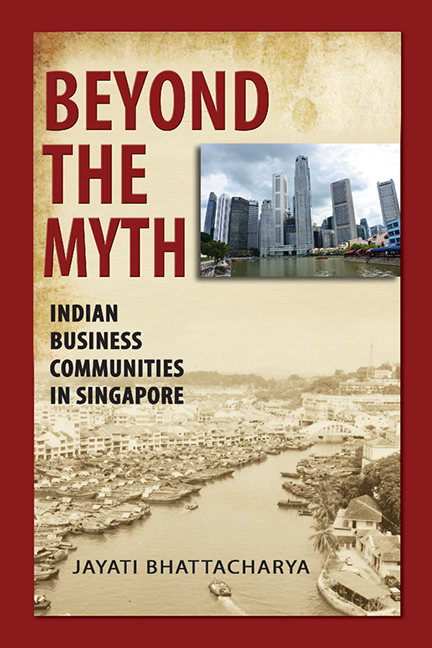Book contents
- Frontmatter
- Dedication
- Contents
- List of Map, Tables and Figures
- Message by Mr R. Narayanmohan
- Foreword by Professor Tan Tai Yong
- Message by Ambassador K. Kesavapany
- Acknowledgements
- List of Abbreviations
- Introduction
- PART ONE
- PART TWO
- Conclusion: Surging Forward
- Appendices
- Select Bibliography
- Index
- About the Author
Conclusion: Surging Forward
Published online by Cambridge University Press: 21 October 2015
- Frontmatter
- Dedication
- Contents
- List of Map, Tables and Figures
- Message by Mr R. Narayanmohan
- Foreword by Professor Tan Tai Yong
- Message by Ambassador K. Kesavapany
- Acknowledgements
- List of Abbreviations
- Introduction
- PART ONE
- PART TWO
- Conclusion: Surging Forward
- Appendices
- Select Bibliography
- Index
- About the Author
Summary
The changing historical trajectories of Singapore have had enormous influence on the growth and development of the Indian business communities in the city-state, both from economic and sociological perspectives. In the course of their ascent in the development ladder, the economies of Southeast Asia witnessed shifts in growth paradigms with increased globalization of capital, rapid transnational mobilization of human resources as well as the new requirements of the contemporary knowledge-based economy. Though with different parameters and backed by increasing interest of the Indian Government in connecting with the successful overseas Indians, the new age has initiated the re-emergence of inter-firm and intra-firm linkages as in the colonial diasporic networks, thus setting the scene for powerful economic synergies between different Indian ethnic settlements in Southeast Asia and the Indian subcontinent.
In the light of the new age developments and the technological revolution, conventional concepts of communities and networks have been seriously challenged. The corporatization of business that has emerged at large among the Indian business community is much diffused from the nuances of caste, region, sect or religion that had earlier bonded business and trade so closely with financial ties and product markets. What has also emerged at present are the business networking activities that are based more on economic considerations irrespective of geographical locations and interpersonal relationships with a much wider scope of activity coordination. This has helped form real and virtual or imaginative communities based on professions, services, products, alumni bodies or shared neighbourhood spaces for business transactions. These have also emerged as overlaps between social organizations and business networks that are neither linguistically based nor with typical regional flavours. Yet, a certain sense of a community prevails, with an essence of ethnicity, in a mixture of different interest groups. Thus, the Indian, Malay and Chinese Chambers of Commerce in Singapore represent to a large extent, the business interests of different communities and participate actively in the shaping and restructuring policies in the city-state.
In the present context of study, one might also perceive the inter-ethnic business relationships between the Indian and Chinese communities in the Singaporean experience. The Chinese have been the largest racial component of the nation state and dominant actors in the political, cultural and economic systems in the administration. Their relationship with the Indian communities has largely been perceived as a relation between the demographic majority and a minority.
- Type
- Chapter
- Information
- Beyond the MythIndian Business Communities in Singapore, pp. 302 - 318Publisher: ISEAS–Yusof Ishak InstitutePrint publication year: 2011

